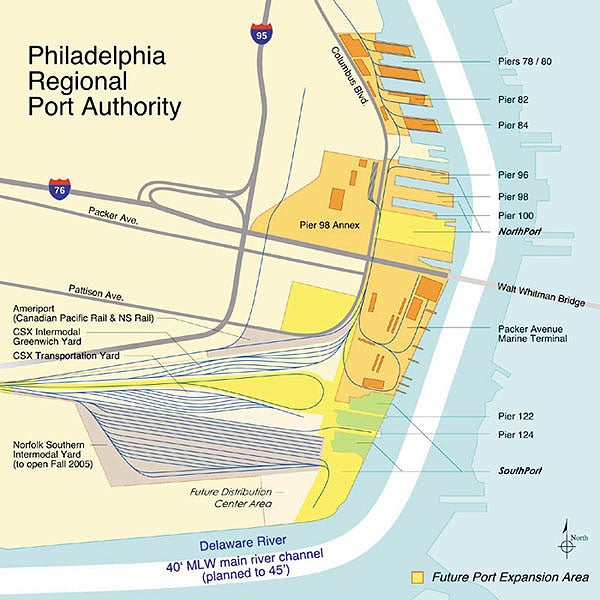Will dredging denial deep-six Southport?

July 24
By Thomas J. Walsh
For PlanPhilly
Friday’s announcement from Delaware Department of Natural Resources and Environmental Control (DNREC) Secretary Collin P. O’Mara, denying the application from the U.S. Army Corps of Engineers to deepen the main navigational channel of the Delaware River and Bay from 40 to 45 feet, could spell doom for an enormous marine terminal project outlined earlier this year for South Philadelphia.
The project, called the Southport Marine Terminal, has been in planning stages since at least the first quarter of this year. Slated for hundreds of acres south of the Packer Marine Terminal and including a large part of the Navy Yard, the first phase of the project alone was estimated to be in the $400 million range.
Kate McNamara, special assistant to Gov. Rendell for maritime activities in Southeastern Pennsylvania, would not comment Friday afternoon about Southport’s fate in the wake of the decision. She referred queries to the press offices of the Philadelphia River Port Authority (PRPA) and the governor.
McNamara, former director of the Port of Philadelphia and Camden and former assistant general counsel of the Delaware River Port Authority, helped present the project publicly for the first time in March, before the Philadelphia City Planning Commission.
She said at the time that four international firms were bidding to enter into a public-private partnership with the Commonwealth, and that the plans were the “result of year-over-year increases in global marine cargo.”
“Most of the proposers say they’d like to see a 45-foot channel in order to make the project viable,” McNamara said at the meeting.
The land for the terminal would be made up of parcels within the Navy Yard and properties adjacent and north of it, now controlled by the Philadelphia Authority for Industrial Development (PAID) and the Norfolk Southern freight railroad company. PAID is the city’s finance and bond-issuance entity, part of the quasi-public Philadelphia Industrial Development Corp.
Billions of dollars in economic development, tax revenues and jobs are at stake, proponents say. The winner of the bid would build and operate the new terminal for 30 to 50 years. By some estimates, a world-class containerized shipping facility could ultimately employ up to 175,000.
“We are disappointed to learn of Delaware’s decision on the permit application for the necessary deepening of the Delaware River,” said Dan Fee, spokesperson for the Delaware River Main Channel Deepening Project, on behalf of the PRPA, in a statement.
“Although we understand the procedural reasons they did not approve the permit request, the [PRPA], the non-federal sponsor of the project, and the Commonwealth of Pennsylvania, a major funder of the project, remain committed to it,” Fee said.
Implications of the denial could be widespread, as the dredging of the river has been a political football for state officials in Pennsylvania, New Jersey and Delaware for close to two decades. In June 2008, the Army Corps of Engineers and the PRPA signed a multi-year agreement on the order of about $379 million to dredge the main channel of the Delaware from Camden’s Beckett Street Terminal to the mouth of the bay, a distance of about 102 miles.
The Corps’ application was submitted in 2001 and sought state “wetlands and subaqueous lands” permits to dredge the Delaware’s main channel, which would remove about 19 million cubic yards of material from the mouth of the Delaware Bay at Lewes to the Delaware-Pennsylvania border.
“It has been clear that this project has been flawed economically and environmentally since it was first approved by Congress in 1992,” said Bill Moyer, former Delaware DNREC Section Manager of the Wetlands and Subaqueous Lands Section, also in a statement. Moyer, who is a member of the Delaware Riverkeeper Network, added, “It is now time to de-authorize the proposal and end the continued waste of taxpayers dollars for this needless dredging.”
Next steps are not clear, beyond the fact that the issue is by no means final. The Army Corps of Engineers can reapply for the permit, or – by some accounts – simply ignore the denial, since it effectively controls the river. The Corps administers the Rivers and Harbors Act of 1899, considered the oldest federal environmental law in the United States.
The Delaware Riverkeeper Network, a nonprofit that does protection, monitoring and restoration work within the Delaware River Watershed (including parts of Pennsylvania, New Jersey, Delaware and New York), has been highly critical of the Corps.
“The Army Corps has already stated, on the record, that it is going to ignore their legal obligation to secure a Coastal Zone Consistency Determination from the State of New Jersey,” the Network states its Web site. Saying that the Corps has been unable to get its Delaware wetlands permit, they add, “The Army Corps is now taking the position they are not legally obligated to get this permit and can chose to move forward without it.
“At the same time, the Government Accountability Office, the investigative arm of Congress, is in the midst of its third economic review of this project. The Army Corps is refusing to await the outcome of this review.”
According to a statement issued Friday afternoon by the DNREC, “O’Mara’s action is consistent with the recommendation of the hearing officer that presided over the hearing and development of the record – one of the largest in DNREC’s history.
“The scale of the project has changed substantially from the project envisioned in the 2001 application, and there has been a great deal of new information developed in the intervening period about the Delaware River and Bay,” O’Mara wrote in his letter to Army Corps District Commander Thomas Tickner (and also included in the statement).
“Given … the significant changes to the scale of the project, the outdated nature of the record, and the potential procedural flaws in making such an important decision based upon the existing record, I have no alternative than to deny the permits.”
Fee said he could not immediately comment on the possible effects of the denial to the Southport Terminal project, but that the dredging project itself would “not only create more than 13,000 new jobs and provide millions of dollars of positive economic benefit, but it will improve the safety of the river for every ship that pulls into port.”
“We look forward to continuing to work with leaders in the three states and the Army Corps of Engineers to reach a resolution and make this project, begun over 20 years ago, a reality,” Fee concluded.
On the Army Corps’ Web site, the “Delaware River Main Channel Deepening” project is said to cost about $277 million, with about two-thirds of that amount funded by the Federal government and the remainder by the PRPA.
Contact the reporter at thomaswalsh1@gmail.com
ON THE WEB:
DNREC reports: http://www.dnrec.delaware.gov/Pages/default.aspx
PlanPhilly (March 17, 2009): http://www.planphilly.com/node/8486
U.S. Army Corps of Engineers, Philadelphia District: http://www.nap.usace.army.mil/cenap-pl/drmcdp/drmc.htm
PRPA statement: http://www.philaport.com/news/newsreleases.htm#StatementDredge
Delaware Riverkeeper Network: http://www.delawareriverkeeper.org/takeaction/urgent-action.asp?ID=65&cat=Dredging&subcat=
Contact the reporter at thomaswalsh1@gmail.com.
WHYY is your source for fact-based, in-depth journalism and information. As a nonprofit organization, we rely on financial support from readers like you. Please give today.



